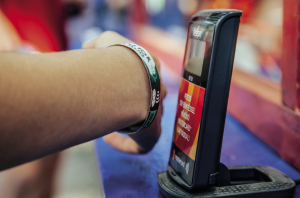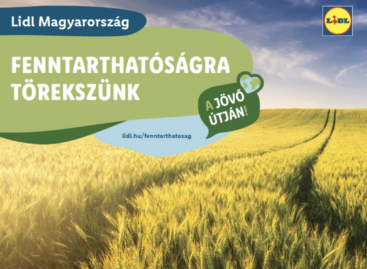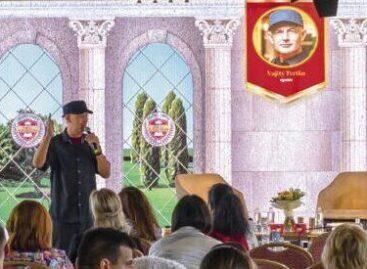Magazine: When Mohammed must go the mountain…brand building at festivals
The street food business has expanded rapidly in the last few years and it keeps changing. Retailers, restaurants and cafés see greet potential in participating in gastro events, as what could be more attention-raising than driving a food truck to a festival where thousands of people are having fun, and serving not only food and drinks, but also ‘selling’ marketing messages there?
Any festival presence is good, but culinary festivals are even better, because it offers the chance to both established and up-and-coming brands to test how much consumers like their products – there is instant feedback from buyers. A culinary festival is also the perfect occasion for companies, retailers, restaurants and cafés to communicate with each other. Plus a well-advertised brand can gain popularity at a festival by word-of-mouth marketing.
An abundance of food and drinks…
… is a available to festival-goers at gastro events. Since food and drinks make a big impression on consumers, restaurants, confectioneries and catering companies can do successful brand building work at festivals. It isn’t cheap to be there at these events, but the investment usually returns quickly.
A good example of this is Hooch, an alcopop brand that used to be very popular in the 1990s and made a return in the United Kingdom in 2012, courtesy of Global Brands. The brand’s double-decker bus called Hooch Hut turns up at every festival and the company often invites influencers to make things livelier at the counter. This excellent and Instagram-friendly branding idea from Hooch works very well: in the summer months – the high season for festivals – sales soar by 46 percent. Brothers Cider has been present at festivals since 1995 and they have become so big that in 2019 they were the only company to be allowed to sell cider at Glastonbury. Two years ago Brothers Cider went to 48 festivals in one summer and reached 1 million customers there.
Many food and drink companies setting up shop at festivals use large-sized menus or product photos to attract customers. Free tasting and price promotions are also winners, plus they have the advantage that the brand can be easily introduced to consumers, while the loyalty of those already familiar with it is likely to increase, too.
Cash? Forget it!
In the last 2-3 years most major festivals introduced partly or fully cash-free payment solutions. The ‘Grand Reopening’ after the pandemic will definitely favour 100-percent contactless and cash-free payment methods. British festivals are using NFC payment and RFID wristbands, and the latter seems to be more popular as there is no need for Wi-Fi connection, a smartphone or a bank card to use it. All users need to do is register in advance and upload a sum of their choice. As an added benefit for businesses, surveys have found that people spend up to 25 percent more when using cash-free solutions.

There is no need for Wi-Fi connection, a smartphone or a bank card to use the RFID wristbands
Sustainable festivals
Probably no one is surprised to learn that the more people go to a festival, the more waste they generate. Huge quantities of drinking straws, plastic cups and cutlery are left behind, but hopefully this will change for good soon, as festivals are switching to compostable and biodegradable packaging. In California music festival Lightning in a Bottle provides free drinking water at festivals, in order to reduce the quantity of plastic bottles. Bonnaroo uses compostable cutlery, while Glastonbury and Shambala have opted for reusable stainless steel bottles.

There are many different festivals that have one single thing in common: they are increasingly conscious of their ecological footprint
//
Heineken Hungária: A deep impression on consumers

Blanka Németh
group brand manager
Heineken Hungária
Heineken Hungária has been present at festivals for a long time, introducing its new innovations to the wider public. These are great occasions for the brand to make a deep impression on consumers – told Blanka Németh, Heineken Hungária’s group brand manager for Hungarian brands. She added that if there will be festivals this year, they would like to demonstrate how they plan to make the events they sponsor greener. At festivals the plastic beer glasses are the POS material that is used most widely, so the brewery makes sure sustainable glass solutions are used. //
Borkultúra: To make up for missed experiences

Rita Oláh
press officer
Borkultúra
Borkultúra reckons festival presence really pays off, as they can reach consumers directly there. Creative, attention-raising and active presence is what works well. Press officer Rita Oláh informed that after the lockdown they want to offer people an opportunity to make up for their missed experiences: they plan to organise the 10th Rosalia – Rosé and Champagne Park event on 2-4 July and the 30th Budapest Wine Festival on 23-26 September in Buda Castle. ////
Food Truck Show: The perfect place for brand-building
Food truck has become a phenomenon in recent years: in 2019 sales by street eateries were up 20-30 percent. In the pandemic situation food trucks are more popular than ever before, as customers can enjoy great food safely in the open air. Zoltán Vad-Horváth, president of the Hungarian Street Food Association and organiser of the Food Truck Show told: the event assists in the brand building of participants in many ways. This year the show will use new, innovative solutions to be plastic-free.//

Mastercard: Card, contactless payment and comfort

Ferenc Szász
business development director
Mastercard
Mastercard has been present at numerous Hungarian festivals for many years. In part this was one of the reasons why the use of contactless payments could spread at these events, replacing cash payment fully. Ferenc Szász, business development director of the company – which launched its Doppio POS terminal infrastructure development programme back in 2019 – said: festivals familiarised many people with contactless bank card payment and the Doppio program came just in time, as the pandemic increased the demand for terminals from retailers. //
Coca-Cola: A unique brand experience

Gergely Kölcsei
senior brand manager
Coca-Cola
Coca-Cola believes music can be the bridge that connects the brand with consumers, and festivals offer a great opportunity for this to happen. According to senior brand manager Gergely Kölcsei, they support good causes in partnership with festival organisers – a good example of this is the #loveislove campaign – and at the same time provide festival-goers with a special brand experience, e.g. last time they created a Christmas atmosphere at a summer festival. //
ALDI: Safety comes first!

Bernhard Haider
managing director
ALDI Magyarország
ALDI first set up its pop-up store and grill food terrace at a summer music festival in 2016. The first festival presence was a success, so many more followed for ALDI. Managing director Bernhard Haider told: at the end of every summer they evaluate the feedback and shape next year’s festival presence accordingly. ALDI would like to continue going to festivals, but it depends on how the pandemic situation evolves in the next few months what decision the discounter will come to – nothing is more important than safety! //
SPAR: Wine, sports and festivals

Márk Maczelka
head of communications
SPAR
SPAR Hungary has been the main sponsor of the Budapest Wine Festival for years. Because of the pandemic only a limited version of the festival was organised in Buda Castle last September – we learned from SPAR’s head of communications Márk Maczelka. The SPAR Budapest Maraton® Festival is one of Hungary’s biggest amateur running festivals, which was held in 2020 too, with the strictest health and safety measures. //
Small events are likely to revitalise

Pál Simonics
customer relations director
Moonlight Event
Pál Simonics, customer relations director of Moonlight Event Zrt. – a member of Lounge Group – thinks that the festival market will restart with small or medium-sized events in the second half of the summer or early autumn. In his view there is no chance for the return of major musical festivals yet. Diána Juhász, the head of Lounge Group’s media team reckons that marketing work has never been more important than it is now – consumers will forget those event organiser companies that stay silent. Mr Simonics is of the opinion that live programmes are so much better than online events that participants are eager to return to physical meetings. //
Related news
The majority of Hungarians spend less than 50 thousand forints on Christmas gifts, sustainability is an important aspect, but not the primary one
Gift-giving is an essential holiday tradition, but what really matters…
Read more >Lidl has published its 3rd sustainability report
Lidl Hungary’s sustainability report for the 2022/2023 business years has…
Read more >ESG – about sustainability standards, from a legal perspective
Since December 2023 several pieces of legislation have been published…
Read more >Related news
On self-acceptance, self-liberation and the gift of everyday life – We were learning together (Business Days 2024 Part 2)
On Friday at the Business Days conference it was all…
Read more >Brand footprint – or what do Coca-Cola, Kinder and Riska have in common?
The results of the Brand Footprint research coordinated by CPS-YouGov…
Read more >








